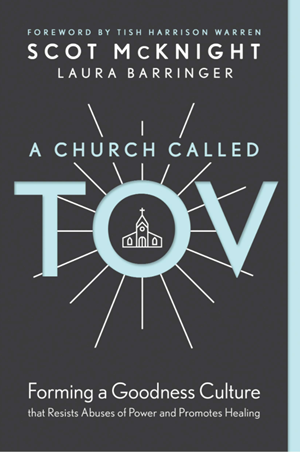Help!, My Pastor is a Narcissist

It is a sad irony that churches at times attract unempathetic, selfish narcissists as leaders. Whether narcissists simply find their way to the top (which must be somewhat true) or the top of the leadership tower attracts the narcissist (which also must be somewhat true), all we know is that too many churches have too many narcissists in leadership. And they are mostly male (so I won’t be as nuanced in alternating between he and she). If we are to have any hope of developing a goodness (tov) culture in our churches, these narcissistic, unempathetic leaders must be resisted. Laura Barringer and I discuss all this more in our soon-to-appear book, A Church called Tov, and our focus is on the seven characteristics of churches that form into tov (or goodness) cultures.
But let’s be careful about this term “narcissist”: not all leaders are narcissists and not even all strong leaders are narcissists. Some people fling “narcissist” at anyone they don’t like who is a leader “above” the person.
So let’s get an official description on the table and I will use the Mayo Clinic summary.
Narcissistic personality disorder [NPD] . . . is a mental condition in which people have an inflated sense of their own importance, a deep need for excessive attention and admiration, troubled relationships, and a lack of empathy for others. But behind this mask of extreme confidence lies a fragile self-esteem that's vulnerable to the slightest criticism.[i]
We discus this more in the book but I summarize in points: a narcissist has...
- An inflated sense of importance
- A need for admiration
- Signs of troubled relationships
- Lack of empathy for others
- Vulnerable to the slightest criticism.
If you are reasonably confident your pastor has these marks, or at least some of them, you might have a narcissist for a pastor. Be very careful about using “narcissist” and don’t toss it around lightly.
This is for me perhaps the most damning label someone can foist upon a pastor because the One who gave himself for others, who denied himself to the point of the public display of a hideous cross, is then being followed by self-aggrandizing, pompous, self-centered leaders who surround themselves with sycophants who bow to every need and excuse every fault. A narcissistic pastor is a contradiction of the gospel itself. We have two chapters about churches and pastors and how each can form into cultures of goodness.
What to do if you think your pastor is a narcissist?
I’m tempted to say “Good luck!” and the end the post right here. I have it on good word that psychologists are not often ones jumping up and down about success in treating narcissists.
Notice that each of the elements of an NPD counters the gospel and fights the very character of Jesus himself. The narcissist is a juggernaut in a church and will inevitably work toward a culture that “sanctifies” himself (or herself) as the God-ordained leader and all opposition is opposition to Almighty God.

So again, what to do? I have these suggestions.
Before anything else, let’s talk prevention. Work toward a tov culture (goodness culture) that instinctively recognizes the corruption of narcissism on the stage and habitually resists all narcissism. I must say this: if your church has now called a narcissistic pastor, your church has the makings of a culture that supports such a personality and such a pastor. Perhaps you were naïve in calling the pastor but now that you’ve got him, you’ve got to deal with him.
Remember, the narcissistic pastor (an oxymoron!), like the rhinestone cowboy, wants to be in the limelight and wants constant praise. Bragging about the church is for that kind of pastor bragging about him (or her). The narcissist pastor loves to brag about his church because he’s getting the glory or basking in the glory. That’s the narcissist’s “jam.”
So what to do? The big idea that we develop with stories and biblical teachings is to form a tov culture that resists narcissistic leaders. How to do that?
First, pray. Read your Bible about Jesus’ way of the cross (Mark 10:35-45). Seek counsel with wise leaders who are marked by tov (goodness) and Spirit-led grace. Pray some more. Pray for a quiet revolution of tov that drowns the narcissism.
Second, resist making the pastor a hero, resist bragging about the pastor, resist those who brag about the pastor. When parishioners are all bragging about the pastor you most likely have a pastor who wants to be bragged about. (Not always.) The narcissistic pastor wants glory and makes glory a good thing and it has to be discerned for what it is and resisted.
Third, often times the bigger the church the bigger the ego it takes to “manage” and “control” and “lead” and “guide” the church. I use quotation marks here because the more egocentric the pastor the more likely the term is “control.” Not all megachurch pastors are narcissists, but narcissists are attracted to megachurches. In fact, narcissists are attracted to power. So, solo pastors with lots of power and authority and control, no matter the size of the church, are attractive to the narcissist.
Fourth, form groundswells of magnifying the work of others in order to form a culture that is other-oriented instead of pastor-oriented.
Fifth, emphasize those in need, their stories and how the church can serve them. Remember narcissists have no genuine empathy and what empathy they show is often done to magnify themselves (and their supposed empathy). Resist the pastor taking credit for other-oriented services done by church folks. Tell stories of others serving others. Help form cultures that are other-oriented.
Sixth, form pockets of culture that are committed to reconciled relationships. Narcissists have lots of broken relationships, so a tov culture must work on reconciled relationships as a new kind of culture.
Seventh, find “board” members (whatever it is called: elders, deacons, leadership council) who have the courage to work for a tov culture and who discern and resist pockets of narcissistic culture. Know that they will be brow beaten at times, humiliated, and publicly shamed but it’s your church, not his. I know elders who have talked with us about resisting narcissistic pastors and it’s a never-ending battle that the elders never seem to win. Keep resisting and working for tov in all directions. Do this with Christian grace. Don’t fight a narcissist with rage because the rage is his secret room.
Eighth, work for accountability at all levels. Narcissistic pastors, of churches large and small, seemingly gravitate toward nondenominational churches or nonaccountable church structures where they answer to no one. They prefer it that way.
A final word from Robert Enroth, an expert on dysfunctional churches and pastors:
It is my opinion, based on extensive research and informal observation, that authoritarian leaders are ecclesiastical loners. That is, they do not function well or willingly in the context of systematic checks and balances. They are fiercely independent and refuse to be part of a structure of accountability. To put it crudely, they operate a one-man (or one-woman) spiritual show. And God help the person who gets in the way or makes waves. Yes, sometimes they will point to a board of elders or its equivalent, but more likely than not, this turns out to be a faithful inner circle of clones that implicitly accepts all that the leader sets forth.
A really good new book, completely devoted to this singular topic, is by Chuck DeGroat, When Narcissism Comes to Church
[i] “Narcissistic personality disorder,” Mayo Clinic, https://www.mayoclinic.org/diseases-conditions/narcissistic-personality-disorder/symptoms-causes/syc-20366662
Jesus Creed is a part of CT's
Blog Forum. Support the work of CT.
Subscribe and get one year free.
The views of the blogger do not necessarily reflect those of Christianity Today.


















